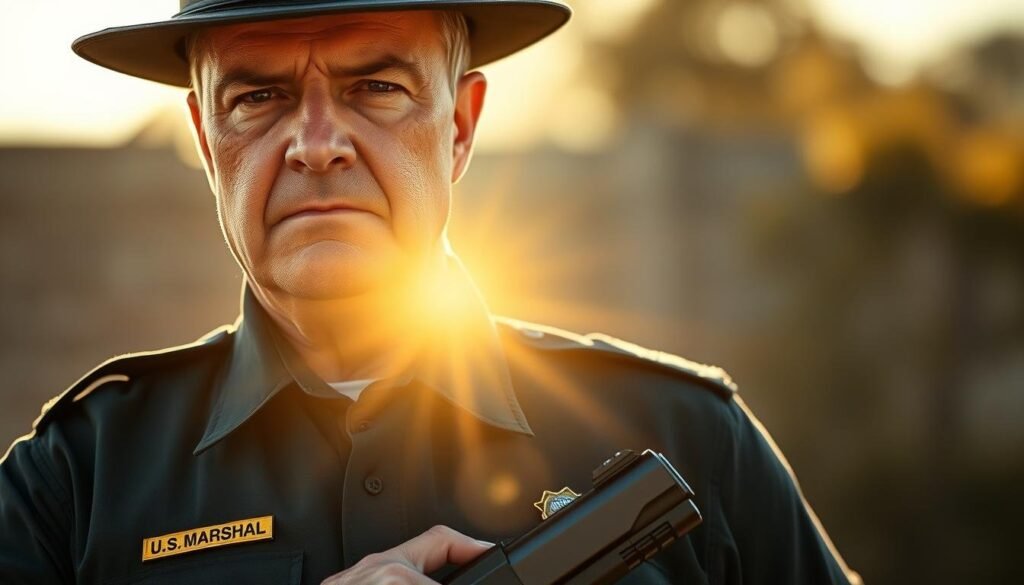Can a US Marshal Arrest the President? Have you ever thought about how law enforcement works with the President? It’s a complex mix of laws and constitutional rights. This question gets to the heart of who can act against the President.
The US Marshal Service is a key part of the country’s law enforcement. But, when it comes to the President, there are special immunities and protections. This topic helps us understand what US Marshals can and can’t do, and the rules that protect the President.
Looking into the US Marshal authority and Presidential immunity shows us how law enforcement and the President work together. It’s all about understanding the limits and powers of each side.
Contents
- 1 Presidential Immunity and Constitutional Protections
- 2 The Authority and Jurisdiction of US Marshals
- 3 Can a US Marshal Arrest the President?
- 4 The OLC Opinions on Presidential Immunity
- 5 Constitutional Mechanisms for Presidential Accountability
- 6 Conclusion: Can a US Marshal Arrest the President?
- 7 FAQ
- 7.1 What is the role of the US Marshal Service in enforcing federal law?
- 7.2 Can the President be arrested by a US Marshal?
- 7.3 What is Presidential immunity, and how does it work?
- 7.4 How do US Marshals enforce court orders, and what are their limitations?
- 7.5 What are the constitutional mechanisms for holding the President accountable?
- 7.6 Has a US President ever faced legal action, and what were the consequences?
- 7.7 What is the Office of Legal Counsel (OLC), and what is its role in advising on Presidential immunity?
- 7.8 How do the principles of separation of powers impact the ability of a US Marshal to arrest the President?
Presidential Immunity and Constitutional Protections
Presidential immunity is deeply rooted in the US Constitution. The Constitution gives the President certain protections. This ensures the office is not hindered by legal actions too much. This immunity is not complete, but it’s still a big help.
The idea of separation of powers is key to understanding presidential immunity. It stops the judiciary and legislative branches from getting in the President’s way. This balance is important for the government’s power.
Did you know that presidential immunity also includes sovereign immunity? This means the government, including the President, can’t be sued without its okay. This protection is key to the executive branch’s work.
But, the President’s constitutional protections aren’t complete. They protect the President from some lawsuits, but not all. Knowing these limits is crucial to understanding presidential immunity.
In short, presidential immunity is a complex idea. It’s tied to constitutional protections and the principles of separation of powers and sovereign immunity. As you learn more, you’ll see how these protections shape the President’s role and duties.
The Authority and Jurisdiction of US Marshals
US Marshals are special law enforcement officers. They have unique powers and duties. Their authority comes from being part of the US Marshals Service, a federal law enforcement agency.
The US Marshals Service can enforce federal laws and court orders. They can make arrests, serve warrants, and move prisoners. They can work anywhere in the United States and its territories.

US Marshals follow many federal laws and rules. For example, they can:
- Apprehend fugitives
- Provide security for the federal judiciary
- Transport federal prisoners
The table below shows important parts of the US Marshals’ authority and jurisdiction:
| Authority | Description | Jurisdiction |
|---|---|---|
| Arrest Powers | Make arrests for federal crimes | Throughout the US and its territories |
| Court Security | Provide security for federal courts | Federal courthouses |
| Prisoner Transport | Transport federal prisoners | Between federal facilities |
In summary, US Marshals have wide authority and jurisdiction. They enforce federal laws and court orders. Their role is key to keeping the federal justice system strong.
Can a US Marshal Arrest the President?
Exploring the relationship between US Marshals and the President reveals complex legal and constitutional issues. The question of arresting a sitting President is at the heart of these complexities. It depends on the legal framework for US Marshals and the President’s immunity.
US Marshals have the power to enforce federal laws and make arrests. Yet, the President, as the head of the executive branch, enjoys certain immunities and protections under the Constitution. The interaction between these legal aspects is key to figuring out if a US Marshal can arrest the President.
The Office of Legal Counsel (OLC) has given important opinions on presidential immunity. These opinions are vital because they show the executive branch’s legal views on the President’s status.
The OLC Opinions on Presidential Immunity
The OLC has generally said the President can’t be criminally prosecuted while in office. This is because the President’s duties are so critical. Prosecuting them could hinder their ability to do their job.
These opinions highlight the challenges in deciding if a US Marshal can arrest the President. While US Marshals have wide authority to enforce laws, the President’s immunity is a big legal obstacle.
In summary, the question of whether a US Marshal can arrest the President is deeply tied to the President’s legal and constitutional protections. Understanding the OLC’s views on presidential immunity is essential for grasping this complex issue.
Constitutional Mechanisms for Presidential Accountability
It’s key to know how the President is kept in check for a healthy democracy. You’re about to learn about the laws that keep the President in line.
The U.S. Constitution sets up a system of checks and balances. This system is key to presidential accountability. It has several ways to make sure the President is answerable, like impeachment, congressional oversight, and judicial review.
Impeachment is a big deal for keeping the President in check. It’s when the House of Representatives charges the President, and the Senate tries the case. Congress also has the power to check the President’s actions through oversight.
Judicial review is also crucial. It lets courts check if the President’s actions are legal. This stops the President from going too far.
| Mechanism | Description | Constitutional Basis |
|---|---|---|
| Impeachment | Process for removing the President from office | Article II, Section 4 |
| Congressional Oversight | Congress’s ability to investigate the executive branch | Article I, Section 8 |
| Judicial Review | Courts’ power to review the constitutionality of the President’s actions | Article III, Section 2 |
Historical Examples of Former Presidents Facing Legal Action
Many former Presidents have faced legal trouble. This shows how well these laws work. For example, President Richard Nixon was facing impeachment and resigned before a vote. President Donald Trump was impeached twice but was acquitted both times.
These cases show that these laws are not just ideas. They have been used in real-life situations in U.S. history.
Conclusion: Can a US Marshal Arrest the President?
You now understand the complex issues about whether a US Marshal can arrest the President. The authority of US Marshals and Presidential immunity are key. They help answer this question.
Exploring constitutional protections and mechanisms for Presidential accountability has given you insight. You see the legal realities and complexities of this scenario. The US Marshal authority is important in enforcing laws, but there are limits with the President.
Presidential accountability is ensured through constitutional mechanisms. This means the President is not above the law. You can now appreciate the nuances of the US legal system and the principles that govern the relationship between the US Marshal Service and the President.
See Also: Can the President Fire Executive Branch Employees?
FAQ
What is the role of the US Marshal Service in enforcing federal law?
The US Marshal Service enforces federal law. They make arrests, serve warrants, and protect federal courts and officials.
Can the President be arrested by a US Marshal?
The President has special protections. These include immunity from some lawsuits and legal actions. This might limit a US Marshal’s power to arrest them.
What is Presidential immunity, and how does it work?
Presidential immunity protects the President from lawsuits and legal actions. It’s based on the separation of powers and sovereign immunity.
How do US Marshals enforce court orders, and what are their limitations?
US Marshals enforce court orders by making arrests and seizing property. But, they must follow the law and the Constitution. They also respect individual rights, including the President’s.
What are the constitutional mechanisms for holding the President accountable?
The Constitution has ways to hold the President accountable. These include impeachment, congressional oversight, and judicial review. These can investigate and address the President’s alleged wrongdoing.
Has a US President ever faced legal action, and what were the consequences?
Yes, several US Presidents have faced legal action. This includes impeachment and lawsuits. The consequences have been varied, like removal from office and damage to reputation.
What is the Office of Legal Counsel (OLC), and what is its role in advising on Presidential immunity?
The OLC is part of the US Department of Justice. It advises the President and other officials. This includes opinions on Presidential immunity and constitutional matters.
How do the principles of separation of powers impact the ability of a US Marshal to arrest the President?
The principles of separation of powers limit a US Marshal’s power to arrest the President. The President is the head of the executive branch. This division of power affects their ability to act.

Hi, I am Tatum Bradford from Washington. I have a background in political science and work as a senior revenue officer. I love learning about U.S. presidents and sharing interesting facts about political history.

